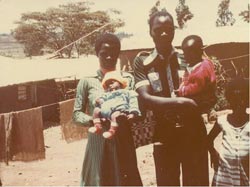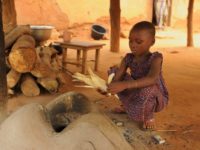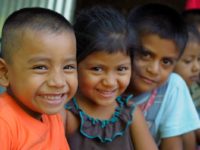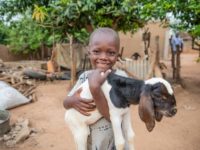I believe all children growing up, regardless of which corner of the world they were born into, will always have a dream of what they want to be when they grow up. Some live their dream well; others are not lucky enough to live their dreams.
 As a child, I held onto my dream despite the glaring poverty that threatened to kill it. I dreamed I would be some sort of a great leader when I grew up. My parents always reminded me that it would be important to work hard in school and trust in God in order for my dreams to come true.
As a child, I held onto my dream despite the glaring poverty that threatened to kill it. I dreamed I would be some sort of a great leader when I grew up. My parents always reminded me that it would be important to work hard in school and trust in God in order for my dreams to come true.
Childhood memories are still fresh in my mind. I grew up in a neighborhood of 10′ x 10′ shelters made out of sticks, mud walls and iron sheet roofs.
My father volunteered as a church planter in the slums while my mother made and sold African attire known as ‘Kitenge’ in a small market nearby.
I watched one of my sisters die at age 3. I was only about 4 years old then.
Many children die before the age of 5 in my community. Perhaps that explains why most parents have many children — they have to take chances because they aren’t sure which ones will make it.
I am one of five siblings that survived. My eldest sister is 32 years old and I am the second oldest. I have a younger sister who is 25 and a brother who is 24. My youngest sister is 19.
Infrastructure is a great challenge in my community. There are no nearby hospitals or schools, so we remained isolated from the rest of the world.
Without medical coverage, a hospital visit in the neighboring town reaps hefty hospital bills. It is particularly hard for parents who cannot find employment.
As a result, many parents avoid taking their children to hospital for fear of being detained in hospital if they can’t afford the fees.
Only in serious cases is anyone taken to hospital and, even then, transportation is a challenge. Some of them never make it in time and die on their way.
Bitter herbs are common for most illnesses, and as a kid I dreaded saying I was sick because it was hard to stomach the bitter herbs going down my throat.
Sanitation was and still remains a great challenge in Kibera.
Residents answer the call of nature in buckets in the comfort of their small houses and pack the waste in plastic bags, which they throw out of their windows at night. This practice led to the rise of a new term — “the flying toilets of Kibera.” Curfew hours begin at 8 p.m. in Kibera, and puu-puu begins flying through the windows.
My father believed that the reason he was living in abject poverty is because he never had the privilege of completing his high school education. He resolved to give his children good educations if he could.
My family eventually moved from Kibera to Dandora, about half an hour east of the city of Nairobi.
Dandora is known for being the largest dumping site in Kenya, where crime and all sorts of evil reigns. Dad relocated the family to Dandora because the government was setting up public schools there and he wanted us to be in a neighborhood with public schools.
When we moved to Dandora, I started schooling immediately. My dad, together with five other families, founded Dandora Baptist Church.
Compassion came to my new neighborhood and started a partnership with our church, enrolling children in the child sponsorship program.
The idea of child sponsorship was a new phenomenon in my neighborhood. When the church came asking to enroll the children in the program, many parents were hesitant for a number of reasons; some thought that the church was taking advantage, trying to woo members because the church had only five families as part of its congregation.
The was also a rumor going around that the church wanted to enroll the children in devil worshiping, and this rumor saw many parents becoming skeptical even though their children were eligible for the program.
I had heard the rumor at school, and I pretended that I was not associated with the church. I still remember going home and my parents telling me that they had chosen me to be enrolled in the program since Compassion only took one child per family.
Of course you can tell I was not going to receive the news with joy. I thought my parents had decided to give me away. How unfortunate! What had I done to receive such treatment?
Then came the day of enrollment. Compassion Kenya staff had all the children lined up as their parents watched from the church pews. The registration ages were 4 to 10 years old.
There was no way to tell the ages of most kids since they had no birth certificates. This is common since some kids aren’t born in hospitals, but at home with the help of non-certified midwives.
The only way to tell the age was to have all the children line up and look at their stature. I knew I was 11 years for sure. I wanted to say that I was over age, but the look on my parents face spelled disaster if I was to divulge that.
As the Compassion staff inspected the queue, I hoped that they would pull me out. They pulled quite a number of those who looked old, but my little emaciated body denied me the chance of being pulled out of line.
I almost shouted my real age when the Compassion staff passed me. The numbers of children who passed the “age verification test” was 80, far less than the expected number, so Compassion staff decided to extend grace and enroll ages 4 to 12 years.
That was the moment I knew I was now completely netted. I could see my mother smiling broadly after the pronouncement. She had her fingers crossed all this time, and finally the kids who were enrolled into the program numbered maybe 114.







11 Comments |Add a comment
May God bless all who readed this. I have been to the Danora Bapstist Church and I was really and truely been by the people of that Chruch and the children. They really need all you can do. I am now working for Compassion Internaional. Know told be that I would leave my heart there and fall in love with the pople of Kenya. It is know my life Ministries. All thank be to God for such a work.
Hi Paul – thank you for sharing your story. Sad to think that many parents feared what Compassion was trying to do. That definitely gives us something to pray about – that the families will not fear the work that Compassion is doing and will allow their children to be registered. I’m off to read the second part now.
Thanks for sharing Paul!
@Christopher Acar
Hi Chris, just a little sneak peak into Paul’s testimony … soon you’ll get to find out what Paul does for a living today! His story is truly remarkable & I trust that you’ll be encouraged!!!
That is an amazing story,Paul.As an African who grew up in poverty similar to the one you descrided,I perfectly understand this story.However, what I would like to know is:what do you do today for a living?
Thanks so much for sharing, Paul. What an amazing story! God had you chosen for that project from the very beginning. Imagine that!
@Ken M. – Hi, Ken,
What helps me, when I think about the children in a family who are not registered, is to remember that the registered child often–if not always–teaches siblings, and even parents, what he or she learns at the project. It isn’t ideal, but it really is true that the whole family benefits, in a variety of ways, from even just one child registered (and preferably sponsored by someone who writes, etc., like you!).
Are you packed, yet? :o)
You went through so much and succeeded. I pray that your God given dreams come true and that you have continued success.
It is sad to think that many children didn’t make it into Compassion because parents’ superstitions and misinformation of Compassion’s mission prevented them from enrolling their children.
I know that Compassion can only accept a specific amount of children from a family. It must be difficult for Compassion staff to tell parents that only one child per family can be accepted. Especially when all the children in a family can benefit from intervention.
It’s so sad that many children who were eligible could not be registered, because of the fears engendered by the rumors. I think that speaks of the spiritual battle that rages constantly over the lives of children, everywhere.
I would like to know if many of the children who were pulled out because they looked older than 10 were then accepted, when the age was increased.
Thank you so much for sharing your story, Paul. It is wonderful to see how the Lord’s grace and mercy touched your life through Compassion and how He raised you up to be a leader for Him in Kenya.
That’s an amazing story of how you came to Compassion Paul. I love the part of them extending the age range…it seemed that God had a plan for your life regardless of your fears about the program at the time. That’s encouraging 🙂